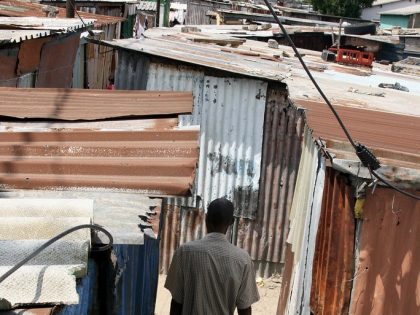
Who is Addis Ababa for?
The planned demolition of one of Ethiopia’s most vibrant cultural centers forms part of an urban planning trend where African cities are re-designed to serve elites.

The planned demolition of one of Ethiopia’s most vibrant cultural centers forms part of an urban planning trend where African cities are re-designed to serve elites.

The film 'No Place But Here' uses VR or 360 media to immerse a viewer inside a housing occupation in Cape Town. In the process, it wants to challenge gentrification and the capitalist logic of home ownership.

Successive Ethiopian governments have continued a 'modernizing' project that not only offers people false dreams, but actively dislocates them from the things that gave them purpose in the past.

In his new book ‘The Blinded City,’ Matthew Wilhelm-Solomon takes readers into inner city Johannesburg not as it was or could be, but as it is.

Documenting an urban housing crisis and how tens of thousands of informal workers and unemployed people struggle to reshape Johannesburg.

In South Africa, land occupiers are evicted from their homes in the name of housing delivery. On the Africa Is a Country Podcast this week, we attempt to understand why.

Urban displacements greatly diminish the living conditions of already desperate populations living on the brink of poverty in Kenya's capital.

South Africans fight for “adequate housing,” freedom from eviction, and a government that will progressively realize both of these goals.

I’ve lived a good part of my life in Mathare 4A, part of the larger Mathare slum in Nairobi. Decent housing remains a pipe dream for the majority of the city's residents.

As the South African ruling class wages a protracted war against the poor and working class, it grows comfortable with the idea that people have more or less accepted the status quo.

The destruction of Tarkwa Bay in Lagos and the battle over what makes a city and who belongs in it.

The politics of local resistance in urban South Africa: Evidence from three informal settlements.

The periodic evictions of poor families in Nairobi follows in a long tradition in Kenya, dating to colonialism, to keep the city as a space for the elite.

Prevailing thoughts on slums stress their transitory character, but the complexity of everyday life in slums, including how people manage survival, is lost in the way they are understood from the outside.

A reflection—by one of the group’s artists—on a Swiss-South African art project exploring eviction and extraction.

Following the new UN report on climate change and agricultural land use, David S. Williams highlights the effects climate changes will have on communities in informal urban areas.

Patricia De Lille, one of South Africa's most popular post-apartheid politicians, claims she tried to redress spatial apartheid in Cape Town, but the legacy of her seven year run as mayor is one of violent forced removals and a refusal to upgrade informal settlements.

For Nigeria, the World Bank reported that as of 2015, 48% of the total population (estimated at more than 180 million) reside in urban centers.

Ghana has a housing crisis and Accra is increasingly marginalizing those who are far from able to get a piece of the real estate pie.

David Adjaye’s plans to 'revitalize' Hallmark House in downtown Johannesburg, raises ethical questions about the city's development plans.